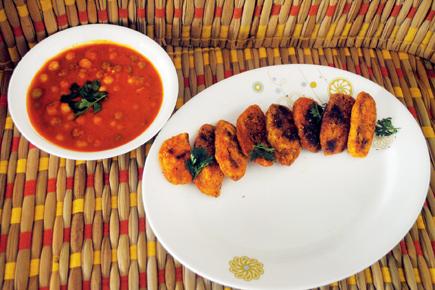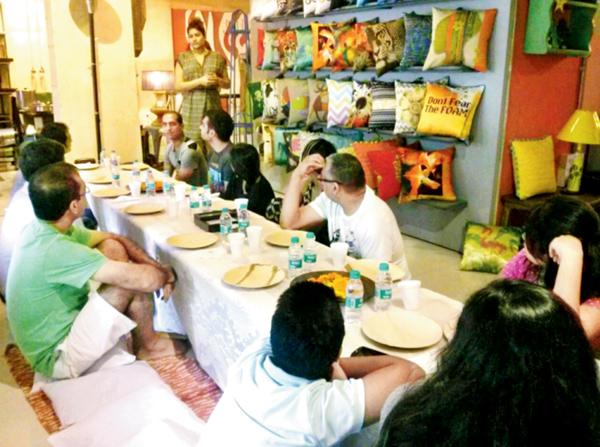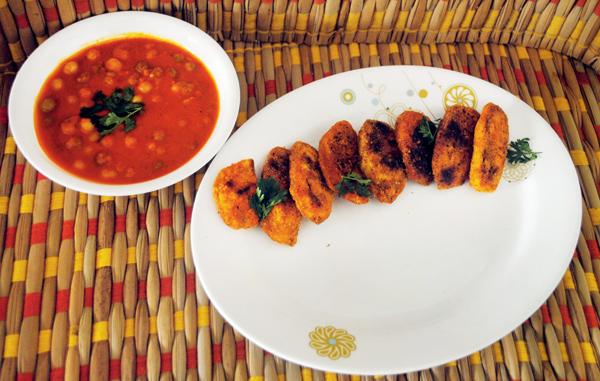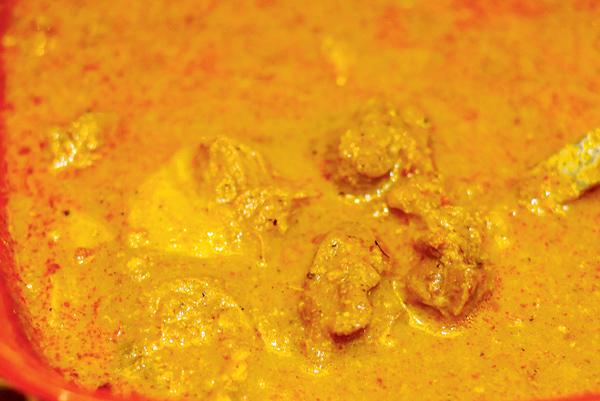Chitrapur Saraswat Brahmins (Amchis) churn out delicacies that are unknown to many. As The Secret Ingredient, a city pop-up introduced foodies to the cuisine, we caught up with the amateur chef to warm up to the Amchi kitchen

Chitrapur Saraswat Brahmin cuisine, CSB, Aamchi cuisine, recipes, Konkani Phodis, Payal Balse, The Secret Ingredient, Mumbai Guide, food special
It’s said that after every 200 km in India, the culture changes. With the number of Indian cuisines that one discovers each day, somehow, it’s easy to believe this statement. Last Sunday, 35 people were introduced to Chitrapur Saraswat Brahmin (CSB) cuisine in the city. The CSBs are one of the four ethnic groups of the Konkan region; the remaining being Goud Saraswat Brahmins, Rajapur Saraswat Brahmins and Kudaldeshkar Gaud Brahmin.
ADVERTISEMENT

The Secret Ingredient pop-up that served Chitrapur Saraswat Brahmin cuisine
Insia Lacewalla and Paresh Chhabria of Small Fry Co have been doing a pop-up called The Secret Ingredient for two months. Lacewalla shares, “When Paresh and I started The Secret Ingredient, the idea was to revive traditional Indian cuisines that isn’t served in restaurants. Unless you know someone who cooks it, it’s not possible to taste it.” Revealing how the idea for the CSB cuisine pop-up emerged, “We have a few friends who are Saraswat Brahmins, and every time we dropped by, we learnt about the cuisine: its flavours, methods, techniques and ingredients.”

Konkani Phodis is an Amchi version of Bhajiyas
Stir the CSB pot
“People haven’t heard about my culture, and our food; it’s time we Amchis (this is what were are called) found representation in the mainstream,” asserts Payal Balse who cooked last Sunday’s pop-up. This make-up artist made delicacies from a cuisine that once had a secret recipe book called Ras Chandrika.

Make-up artist Payal Balse
The CSB Secret Ingredient had a feast lined up, we were told. She started with the vegetarian meal, and cooked a signature dish called Kairas, which is made with a masol (ground wet masala of sesame seeds, coriander seeds, coconut, tamarind, red chillies and jaggery). The dish had capsicum, potato and peanuts.
Next up, the Bhindi Amshe Tikshe arrived. Unlike most lady finger preparations this was in a tomato-based tangy, spicy curry that was tempered with garlic. Also a part of the meal was the iconic potato dish Talasani cooked with garlic and urad dal (spiced with chilli powder and little turmeric).
Balse also presented the Chau Chau (an achari sabzi with potatoes, French beans and carrots) and the Tambli (a cold coconut-based curry eaten at the end to cool your palate).
Balse recalls that their sambhar called Kholmbo, is one that people swear by. In the non-vegetarian section Mandeli Fry (crispy fried anchovies with a chilli-ginger-garlic masala) and Mutton Malwani was served. Paying homage to her mother’s cooking, Balse also included a coconut-laced Chicken Sukke.
Recipe: Mutton Malvani
Ingredients
For the filling
>> 500 gm Mutton (Goat Meat)
>> 4 medium-sized onions chopped
>> Ginger paste - made from a 2 inch piece
>> Garlic paste - made from 8-10 cloves
>> a few springs, chopped coriander leaves
>> 5 tbsp oil
>> Salt to taste
>> 1/2 tsp turmeric powder

Mutton Malwani
For Malvani Masala
>> 10 dry red chillies
>> 2 tsp coriander seeds
>> 4-5 cloves
>> 1/2 tsp peppercorns
>> 1/2 tsp cumin seeds
>> 1/2 tsp carraway seeds
>> 4-5 pods of green cardamom
>> 2-3 pods of black cardamom
>> 1/2 cup dry grated coconut
>> 1 tsp poppy seeds
Method
>> Dry roast the grated coconut until it is brownish in color. At the same time, cook the mutton in a pressure cooker for about 6 whistles.
>> Add 2 tbsp oil and then ingredients for Malvani masala (red chillies, coriander seeds, cloves, ...etc) to the roasted coconut. Fry for about 30 secs to a min. (The spices should sputter a little, but not burn).
>> Remove this mixture from heat, and grind it after it cools down. Keep aside.
>> Pan fry onions separately with 3 tbsp of oil until golden brown.
>> Add the ginger garlic paste to it. Fry for 30 secs.
>> Add mutton, fry for a minute or two.
>> Add the coconut masala mixture, turmeric along with 2 cups of water. Optionally add meat tenderizer. Cover and cook on a low flame. (It should simmer mildly, and never boil vigorously. High heat will make the meat chewy)
>> Once the mutton is falling off the bone (takes about 15-20 mins of simmering on low flame), add more water if you prefer the curry to be not as thick and simmer for 2 mins more.
>> Take off heat and garnish with coriander leaves. Serve hot.
Recipe courtesy Payal Balse
 Subscribe today by clicking the link and stay updated with the latest news!" Click here!
Subscribe today by clicking the link and stay updated with the latest news!" Click here!






